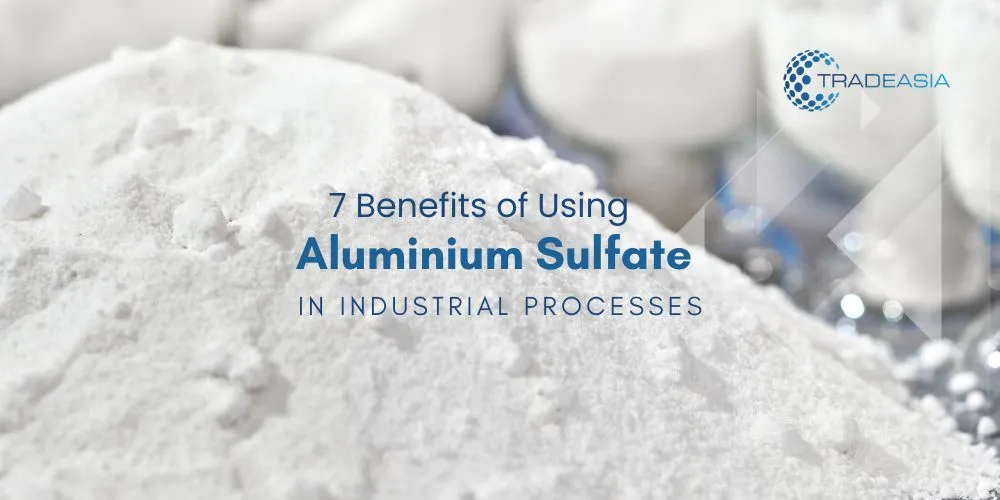Introduction: Why Aluminium Sulfate Matters in Industry
Aluminium sulfate, also known as alum, is a vital industrial chemical used widely across sectors due to its versatility, effectiveness, and affordability. This compound is prominently featured in industries like water treatment, paper manufacturing, and textile processing. Its unique chemical properties make it ideal as a coagulating agent and pH adjuster.
The industrial demand for aluminium sulfate continues to grow, especially in emerging economies like Indonesia. Companies looking for cost-efficient solutions are increasingly turning to this compound to improve product quality and meet regulatory compliance. According to ChemAnalyst, aluminium sulfate demand is expected to rise globally due to its pivotal role in environmental protection technologies.
For businesses in need of high-quality supply and technical support, Chemtrade Asia offers a reliable source for aluminium sulfate distribution across Indonesia and Asia.
Effective Water Treatment Agent
Aluminium sulfate is most commonly known for its use in water treatment facilities as a primary coagulant. It removes suspended solids by neutralizing their charge, enabling them to clump together and be easily removed from water. This is crucial in municipal water supplies and wastewater plants.
According to the U.S. Environmental Protection Agency (EPA), aluminium sulfate plays a key role in removing contaminants like organic matter, bacteria, and phosphates. The compound helps maintain public health standards by clarifying water and reducing pathogen load, which is especially important in densely populated industrial zones.
Manufacturers and municipalities across Indonesia rely on aluminium sulfate to ensure the safety and quality of processed water. For procurement inquiries, industries can reach out via Chemtrade Asia’s contact portal to streamline their sourcing needs.
Enhancer in Paper Manufacturing
In the paper industry, aluminium sulfate is essential for improving paper quality and reducing processing time. It helps in the sizing process, enabling better control of ink absorption and enhancing print sharpness. Moreover, it stabilizes pH levels during pulp processing, which helps maintain consistent paper characteristics.
Research from TAPPI (Technical Association of the Pulp and Paper Industry) supports the application of alum in improving paper brightness and reducing fiber damage during production. It also assists in the retention of filler particles, which lowers raw material costs and enhances finish.
Indonesian paper manufacturers benefit from aluminium sulfate’s local availability and cost-effective integration into existing processes. Explore product details and supply options here.
Dye Fixation in Textile Processing
Textile manufacturers utilize aluminium sulfate as a mordant in dyeing processes. It improves the fixation of dye molecules onto fabric, resulting in better colorfastness and reduced dye wastage. This is critical in ensuring high-quality textile production, particularly for cotton and wool fabrics.
A study published in the Journal of Cleaner Production indicates that aluminium sulfate not only enhances color retention but also reduces the need for additional chemical treatments, thereby lowering environmental impact. It also allows for precise pH control during dye baths.
As the Indonesian textile industry expands its export capabilities, aluminium sulfate becomes an indispensable chemical. Businesses can ensure a steady supply chain through Chemtrade Asia's industrial network.
Cost-Effective and Easy to Transport
One of the most underrated benefits of aluminium sulfate is its cost-effectiveness. It is available in both solid and liquid forms, making it easy to package, transport, and apply in various industrial setups. Bulk procurement further reduces costs per unit, making it an attractive choice for mass production environments.
Additionally, aluminium sulfate has a long shelf life and is stable under standard storage conditions, which reduces inventory losses. According to data from ICIS, its price-performance ratio makes it more favorable than many alternative coagulants or pH stabilizers.
Industries in Indonesia looking to optimize operational costs can significantly benefit from integrating aluminium sulfate. Get a quotation or sample today.
Environmentally Friendly Coagulant
Aluminium sulfate is recognized as an environmentally friendly coagulant. When used correctly, it reduces the chemical load in wastewater and facilitates more efficient sludge handling. It also promotes the reuse of treated water in industrial loops, aligning with sustainability goals.
According to the World Bank’s industrial sustainability report, aluminium sulfate’s role in sludge minimization and water recycling is vital for eco-conscious manufacturing. Unlike many synthetic agents, it does not introduce persistent pollutants into ecosystems.
Environmental responsibility is becoming a major focus in Indonesian industry. Incorporating green chemicals like aluminium sulfate supports compliance with both local and international environmental regulations.
Conclusion: Unlocking Efficiency with Aluminium Sulfate
Aluminium sulfate is a silent powerhouse in various industries. Whether it’s improving water clarity, enhancing paper quality, or supporting sustainable dyeing, the compound delivers performance and value. Its availability, versatility, and eco-friendly properties make it a preferred choice for manufacturers aiming to boost both efficiency and sustainability.
With Indonesia’s growing demand for chemical intermediates, sourcing from trusted suppliers like Chemtrade Asia ensures consistent quality and technical support. Ready to incorporate aluminium sulfate in your processes? Contact our team today for samples, specifications, and tailored quotations.

Leave a Comment